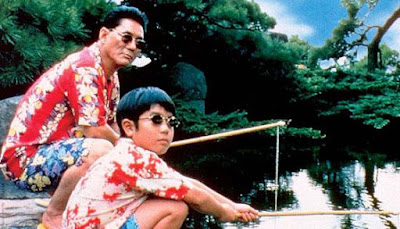 |
| http://www.otraparte.org/actividades/cine/kikujiro.html |
The few Takeshi Kitano movies I've seen are enough to convince me that you just never know. His world is so quiet and still and horrible that only an ecstatic or an ascetic could live in it for long--and Kitano is both in
Kikujiro, his impression of a Chaplin movie--with Chaplin as a Tasmanian Devil constantly complaining--no: It's Keaton vs. Pacino, a schizophrenic Battle Royal for the soul of a cranky Yakuza who agrees to take a kid to visit his mother in another city.
 |
| http://www.second-take.com/ |
It's a road picture, but there is a strange quality to much of it, as though a Magic Realist--Antonio Donghi or Edward Hopper, even Grant Wood--had been asked to help out. The uncertainties of the picture--why the gangster agrees to escort the kid, what the kid thinks of the gangster, why so many people seem ready to put up with the gangsters relentless, petty bullying--and the clean, sun-drenched lines of every scene, the cheerfulness of the music (which sounded familiar, so I checked: Joe Hisaishi, who has done the music for, among many other things, Miyazaki's otherwordly-in-this-world animations), and the overall stillness surrounding the gangster's jittery aura (his eye even twitches now and then, as though some other silent comedian--Ben Turpin, maybe, or Al St. John--were trying to break out of the gangster's skin)--it's all too much, just about, everything posed and poised, tableaux of impending who-knows-what.
 |
| http://en.wikipedia.org/ |
But just when I wasn't sure what to do with it, the picture righted itself and settled out in the fields and woods, the gangster and the kid and a traveling poet and a Laurel and Hardy pair of not-so-tough-guy bikers forgetting the sharp pains of the road and playing like children with nothing but time. Once more I was struck by how precisely each scene was arranged, the figures foolish but centered in the frame like portraits of upside-down royalty goofing around to save the kid from his tears.
The gangster and the kid end up more alike than the two at first could imagine--and I'm glad of it: Despite everything, they figure out how to put up with one another, how to turn their own Japanese urge for simultaneous deference and assertion into something more than friendship. I mean, I wouldn't want the gangster to be my father, but the kid could've done worse.





Comments
Post a Comment